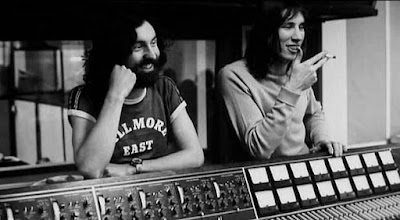Escrita por Roger Waters, foi gravada entre abril e novembro de 1979 e lançada em 30 de novembro de 1979, no disco The Wall, o décimo primeiro da banda. Foi produzida por Roger Waters, David Gilmour, Bob Ezrin e James Guthrie. Waters pegou um briga com a banda e foi pra casa. No outro dia apareceu com essa música, que David Gilmour chama de fantástica. O personagem Pink descreve sua vida solitária, de isolamento, por trás do muro mental que ele criou. Ele não tem ninguém pra conversar, somente seus objetos. Rogers disse que foi isso que ele sentiu na turnê de 1977 da banda, a primeira da banda em estádios lotados. A canção faz referencias à Syd Barrett. Foi a última canção a ser escrita pro disco. Gilmour diz que é uma de suas favoritas do disco. A letra: "I got nicotine stains on my fingers, I got a silver spoon on a chain. Got a grand piano to prop up my mortal remains" foi escrita pra Richard Wright, que lutava na época pra se livrar do vício da cocaína. David Gilmour tocou baixo. Roger Waters cantou e tocou EMS VCS3. Richard Wright tocou sintetizador. Bob Ezrin tocou piano. Também participou da gravação a New York Symphony Orchestra.
A letra:
"But there's somebody
else that needs taking care of in Washington..."
"Who's
that?"
"Rose Pilchitt!"
"Rose Pilchitt?
Who's that?"
(Shut up!)
"36-24-36. Does that answer
your question?"
(Oi! I've got a little black book with me
poems in!)
"Who's she?"
"She was 'Miss Armoured
Division' in 1961."
I've got a little black book with my
poems in
Got a bag with a toothbrush and a comb in
When I'm a
good dog they sometimes throw me a bone in
I got elastic bands
keeping my shoes on
Got those swollen hand blues
I've got
thirteen channels of shit on the T.V. to choose from
I've got
electric light
And I've got second sight
I've got amazing
powers of observation
And that is how I know
When I try to
get through
On the telephone to you
There'll be nobody
home
I've got the obligatory Hendrix perm
And the
inevitable pinhole burns
All down the front of my favourite satin
shirt
I've got nicotine stains on my fingers
I've got a
silver spoon on a chain
I've got a grand piano to prop up my
mortal remains
I've got wild staring eyes
And I've got a
strong urge to fly
But I've got nowhere to fly to
Ooh,
babe, when I pick up the phone
("Surprise, surprise,
surprise")
There's still nobody home
I've got a pair
of Gohil's boots
But I've got fading roots
A versão do Pink Floyd:



















